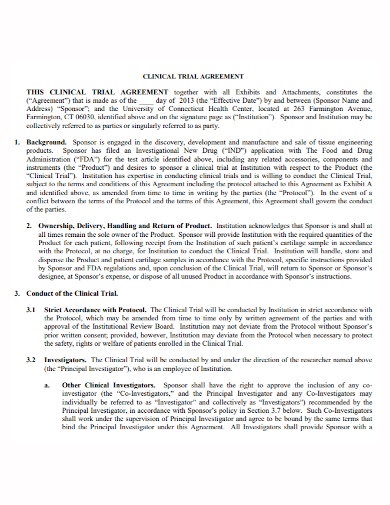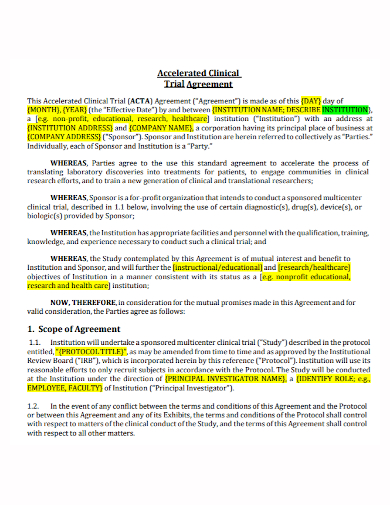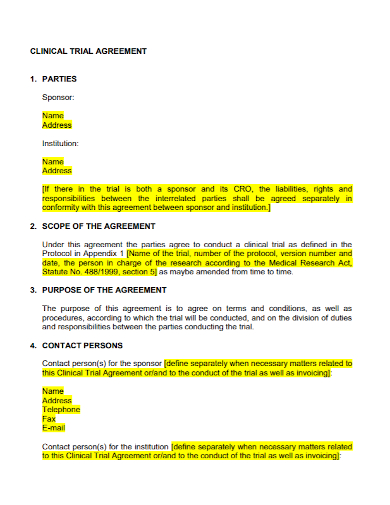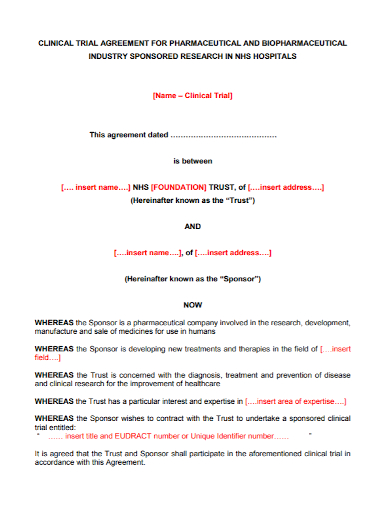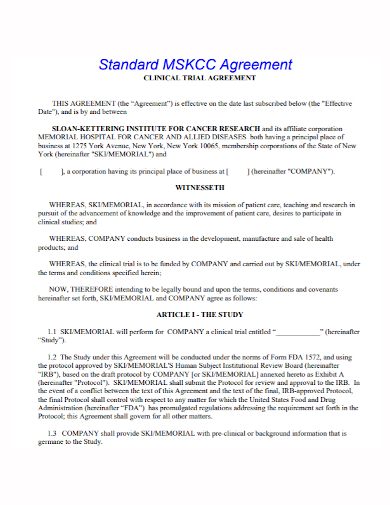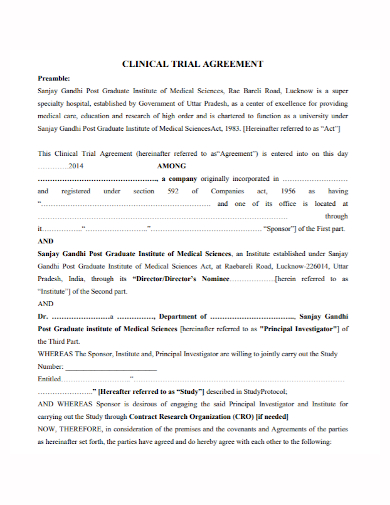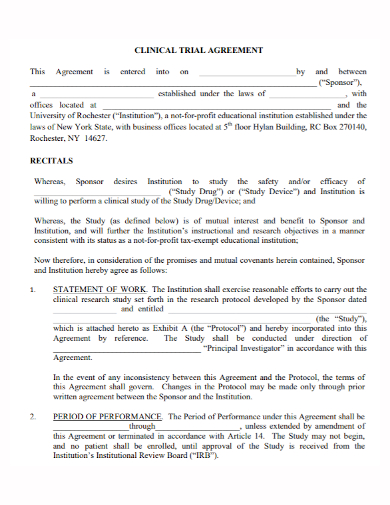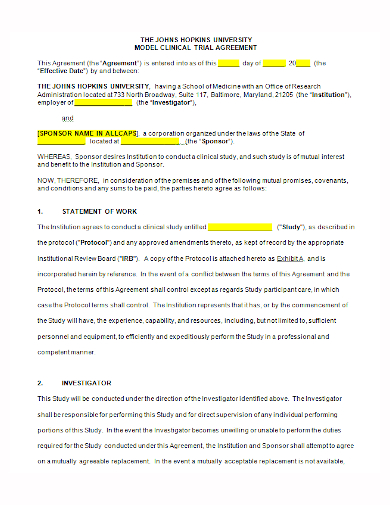With the advancement of medical studies and technology, lots of clinical trials have been done to study the human body and its ailment or diseases, to create new medicine to effectively treat illnesses and lengthen the lifespan of people worldwide, and to test the efficacy of those innovations on people who volunteer to be part of the study and evaluate the volunteers’ reactions to the medicine they were given. However, before commencing the trial, an agreement must be made to make the whole process legitimate and protect all parties from any legal dispute and violations. Read the article to know how to make a clinical trial agreement.
10+ Clinical Trial Agreement Samples
1. Clinical Trial Agreement Template
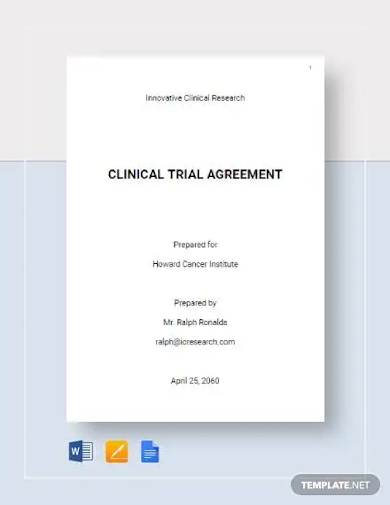
2. Master Clinical Trial Agreement Template
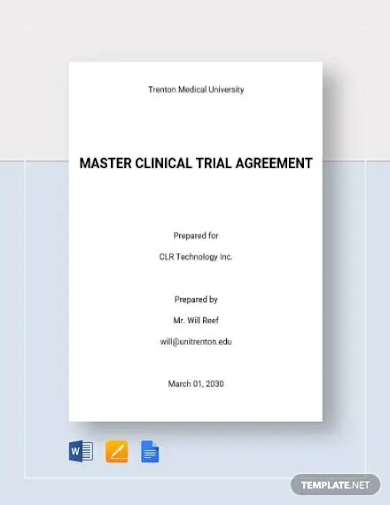
3. Investigator Initiated Clinical Trial Agreement Template
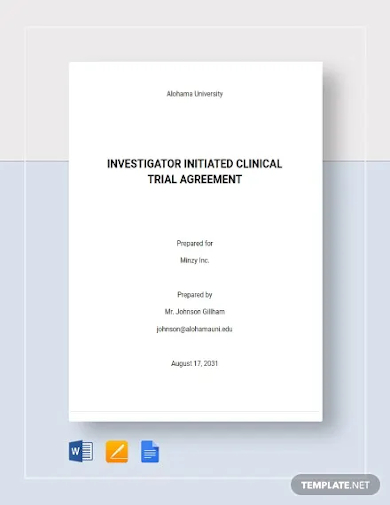
4. Clinical Trial Agreement
5. Accelerated Clinical Trial Agreement
6. Sample Clinical Trial Agreement
7. Clinical Trial Research Agreement
8. Standard Clinical Trial Agreement
9. Company Clinical Trial Agreement
10. Formal Clinical Trial Agreement
11. Model Clinical Trial Agreement
What is a Clinical Trial?
Clinical trials are a type of research in the medical field that studies new tests and treatments for diseases and illnesses. Furthermore, it evaluates the effects of these treatments on human health and its outcomes. Clinical trials are designed, reviewed, and completed carefully since it deals with sensitive information and testing on humans.
For a clinical trial to be a legal procedure, an agreement must be made between the sponsor who provides the study drug or device, and the person volunteering to do the tests. The agreement, or also called a contract, must state all the legal terms and stipulations regarding the tests, acknowledge the responsibilities of both parties, state the requirements for payment and reimbursement, publication and intellectual property terms, insurance for injury coverage, guidelines for resolution on disputes, and grounds for termination of the contract.
Details to Include in a Clinical Trial Agreement
1. Description of the Project
This section of the agreement is where you write down the description of the research project explicitly. Make sure to include all the necessary details on the nature of the agreement as well. This will give clarity when auditing financial payments may come up.
2. Payment Terms and Schedule
In the next section of the agreement, list down the payment terms for the clinical research and studies. The terms must also include where the sponsor can send the invoice of the payment. Create a payment schedule where you can state each deliverable that is expected to be completed in a certain time and the payment that will be made for each of those.
3. Sponsor’s Responsibilities
This section must document the sponsor’s responsibilities and how their research site and their practices must comply with the study protocol, and government laws, and regulations.
4. Publication and Intellectual Property Terms
This section of the contract must present the terms on publishing and presenting the data results obtained during the clinical trial tests. The sponsor must ensure that when reporting the trial results it must be under ethical grounds. Usually, medical journal sites are responsible to publish the results and it should be part of the contract that they need to submit a manuscript of the journal to the sponsor before they can publish it.
5. Indemnification and Insurance Terms
This section is where you lay out all the regulations regarding indemnification, which the sponsor will compensate for loss and assume full responsibility if ever incidents may arise. Make sure to control the limitations of your indemnification language. Don’t forget to include your insurance policy for you as the sponsor and your volunteer to ensure you’re protected from any incidents.
6. Recordkeeping and Inspection
This section is where you include your recordkeeping and inspection policy to ensure that the site and sponsor will store the data safely and map out a timeline on how long they will be kept safe. Furthermore, this section must include their right to audit and verify their data and trials regularly and cooperate with regulatory agencies as well.
7. Guidelines for Dispute Resolution
This section should lay out your attempts at resolving issues that are escalating through mutual resolution. However, if either party decides to take legal action, this section should specify which jurisdiction the case will be handled.
8. Grounds for Contract Termination
This section is where you state the grounds of contract termination of both parties. Spell out the reasons when termination of contract must be done, the timeline of handing out a notice, and compensation details.
FAQs
What are the four phases of clinical trials?
The four phases of clinical trials are:
- Phase 1: This phase is where the clinical trial starts. A”first in man” study is conducted; it tests the safety and toxicity of the medical product.
- Phase 2: This phase must establish the safety and efficacy of the medical product.
- Phase 3: This phase must prove the clinical effectiveness of the medical product.
- Phase 4: This phase must look do the marketing surveillance.
What are the types of sponsors for clinical trials?
There are different types of sponsors to fund clinical trials. They are:
- Commercial sponsors
- Disease or health condition-specific researchers
- Collaborative research sponsors
- An individual institution, such as a university or public hospital
- An individual researcher from a private sector
- Academic investigator of initiative clinical trials
How long are clinical drug trials?
Clinical trials can take around six to seven years on average to complete.
How much do clinical trials pay?
Clinical trials generally pay between $50-$300 per day/visit, with additional compensation depending upon the length of the time required, and the procedures that are performed. Overnight stays typically pay more money compared to repeat visits.
Once you’re done drafting the agreement, make sure to review it first and revise any errors or inaccurate information that you’ve spotted. Make sure that the tone of your contract is straightforward and use simple terms to make it understandable for both parties. You can discuss the contents of the contract with the other party reaching an agreement and signing the contract. To help you get started writing the agreement, download our free sample templates above to use as your guide!
Related Posts
FREE 10+ Trial Agreement Samples In MS Word | Google Docs | Apple Pages | PDF
FREE 9+ Shop Rental Agreement Samples [ Commercial, Lease, Tenancy ]
FREE 10+ Charter Agreement Samples In MS Word | Google Docs | Apple Pages | PDF
FREE 10+ Mentoring Agreement Samples In MS Word | Apple Pages | PDF
FREE 10+ Partner Agreement Samples In MS Word | Google Docs | Apple Pages | PDF
FREE 10+ Individual Agreement Samples In MS Word | Google Docs | Apple Pages | PDF
FREE 10+ Strategic Agreement Samples In MS Word | Google Docs | Apple Pages | PDF
FREE 10+ Equity Agreement Samples In MS Word | Google Docs | Apple Pages | PDF
FREE 10+ Producer Agreement Samples in MS Word | Apple Pages | PDF
FREE 10+ Grant Agreement Samples In MS Word | Apple Pages | PDF
FREE 8+ Meeting Agreement Samples in MS Word | Google Docs | Apple Pages | PDF
FREE 10+ Community Agreement Samples In MS Word | Google Docs | PDF
FREE 8+ Real Estate Option Agreement Samples in MS Word | PDF
FREE 10+ Call Option Agreement Samples In MS Word | PDF
FREE 10+ Advertising Agreement Samples In MS Word | Google Docs | Apple Pages | PDF

